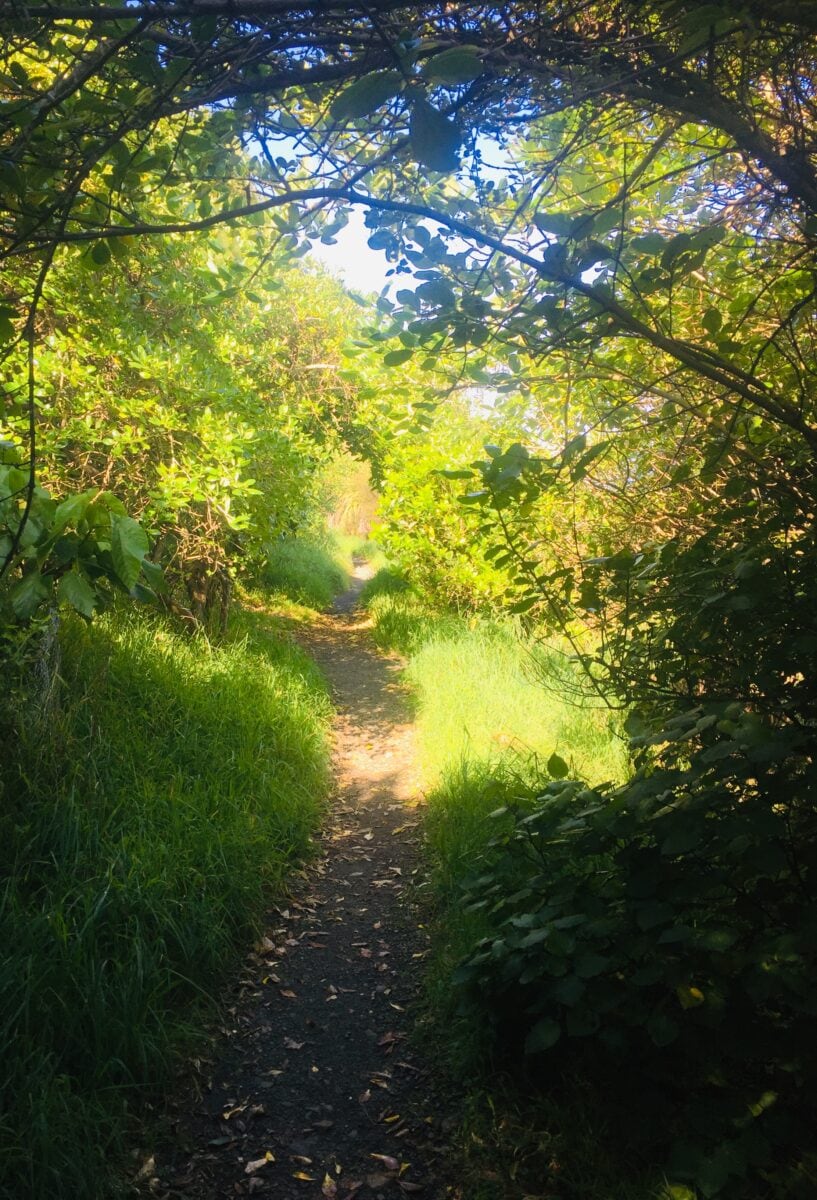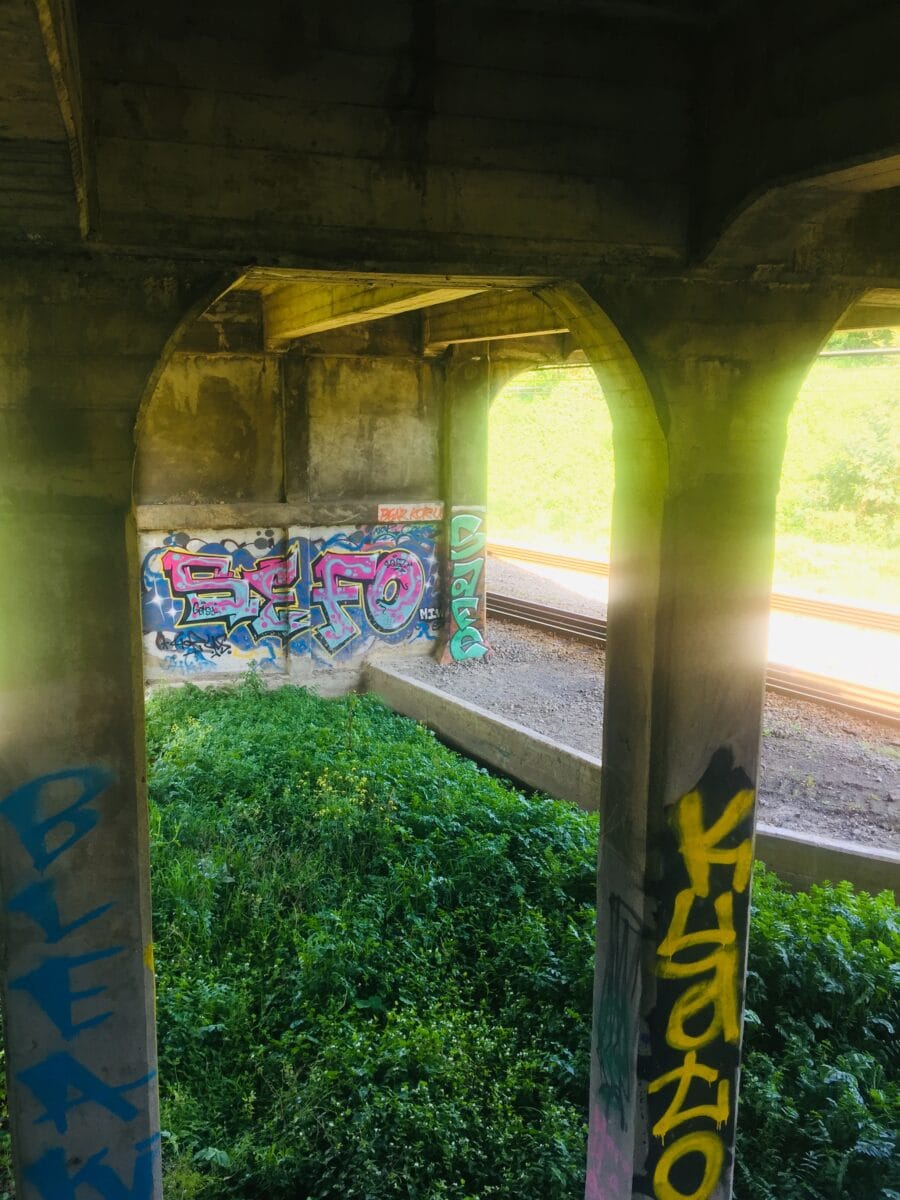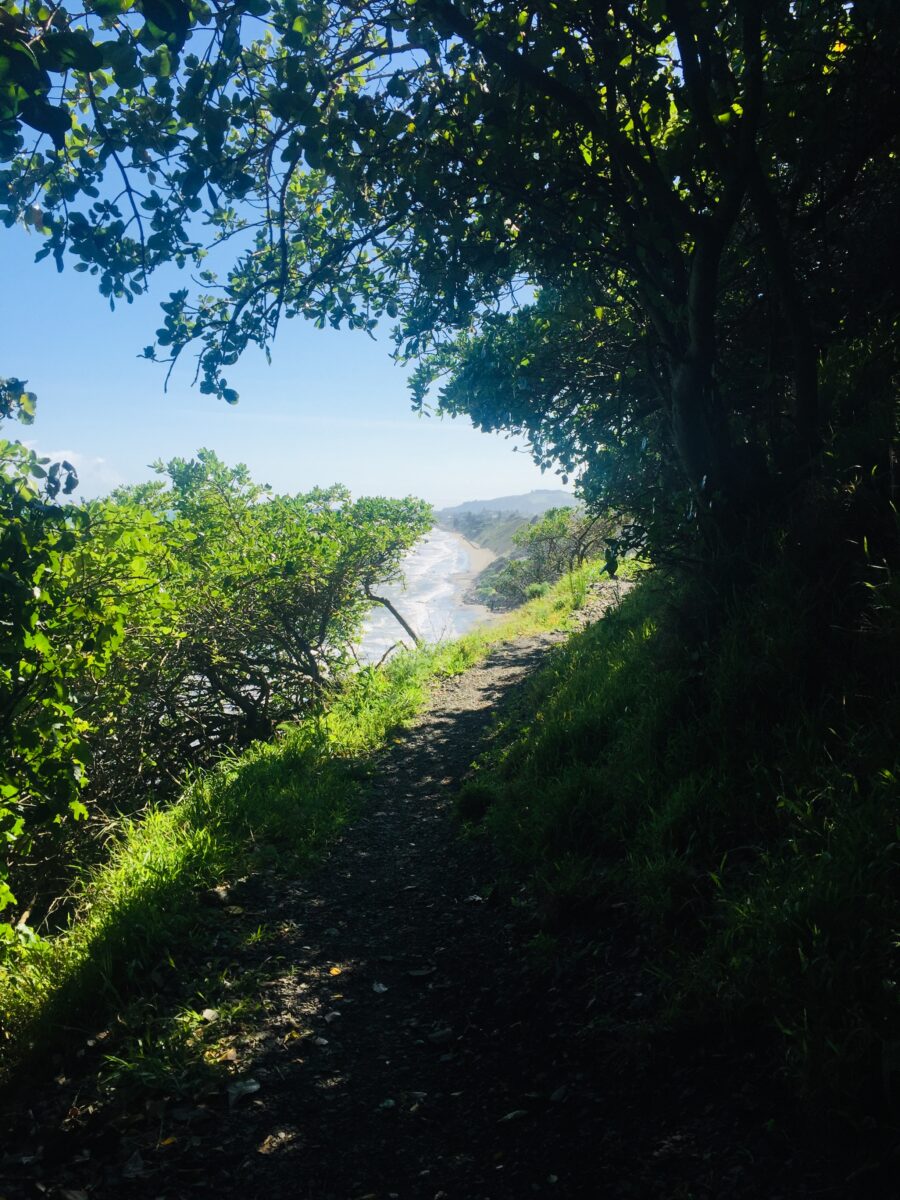In this story, Dani Deluka celebrates Mahuru Māori, the recent month-long kaupapa aimed at using te reo in everyday situations. Pari Pari refers to the historic Māori settlement found just south of Paekākariki on the escarpment. The story beautifully expresses how to overcome adversity through aroha, whakapapa and pākahukahu (strength).

Flushed and frantic I tumbled and tripped over the thick knotted rootbound branches. Glistening dewy spiderwebs and wet kawakawa leaves brushed past my face. My bare feet sunk briefly and swiftly into the damp dirt of the earth and I snapped off a large piece of toetoe to protect me, like a taiaha. Down the bush track I ran, falling down and scrambling up again, heaving with beetroot red cheeks of shame and embarrassment.
Gotta keep going, I puffed. Far far away from the voices, from the taunting.
‘Cry baby cry baby half-caste girl!’
Sunlight curdled the white mist that trickled in through the cracks in the trees, as I hurtled over the moss and mud, through the fern and fennel, over the English ivy and periwinkle, past the boneseed, and the tangled banana passionfruit vines that hooked their way around every living thing.
Dad. ‘It’s just teasing, be brave, stand up to them girl!’
Mum. ‘She’s too sensitive, my darling.’
Kahu flew overhead dipping and diving, threatening to swoop and scoop out my eyes, so a small piwakawaka flitting beside me was a comfort. E hoa. My tiny-feathered friend.
The path twisted and turned, a cacophony of cicadas woken up with the warmth, a morning symphony in harmony with my footsteps. It was a forbidden path for us kids, we were only allowed to go as far as the south end of Ames Street. Never never never along the main highway, never underneath the spray painted graffiti bridge. ‘That’s where the taniwha lives!’ We would all shout and run away. Freedom was abundant, but we needed to be within hearing distance of the driftwood stick banging on the frying pan, our signal after-hours of games like Go Home Stay Home, that it was dinner time.

‘Haere Mai kids!’ We would all scatter back to our houses.
‘Time’s up, see you tomorrow!’
Everyone had nicknames. Hoppity the girl with one leg shorter than the other who walked with a limp. Mad Dog because she literally had a mad dog. Freckles the redhead boy who laughed but swore like the shitters, and spat on people, his father was a politician, he knew how to fight dirty.
Minnie, because she had Mickey Mouse ears, who was kind and soft like me, although she managed to hold in her tears, whereas mine bubbled up and over so everyone could see. Of course that made it worse.
‘Cry baby Beatrice!’
‘There is no half arse anyone in this whānau!’ Dad would bellow out when he heard of the taunting. But then a generous laugh and a scull of beer. He would threaten to give that bloody boy a hiding but he never did, he knew his old man, old chums who sometimes played pool together at the pub.
‘Just kids being kids’ they would say and shake hands or hongi. I wished he would give him a clip around the ear, the kid not the Dad, but I heard he was a bit of a bully too.
You would think that I would have gotten used to it but it still shook me to the core every time he started up. Especially when I was singled out on the walk to school, I would see him coming on his bike. ‘Desmond the dick!’ I would think in my mind but never be brave enough to say it out loud.
That day he pushed me and I fell to my knees, I lost it. Just got up, and took off. Even though my girl mates were saying ‘Hey Bee! Come back, you’ll be late for school.’
I didn’t give a flying fig as my aunty would say.
Fogginess still covered the dense bush but I kept going through the kohekohe, over the carpet of golden honey kōwhai bells, the sweet fragrant foliage of my childhood, losing my footing, but speeding on. The stream babbled alongside me, gently guiding the way.
‘Scaredy cat, dirty rat. ’ Still stinging in my ears.
Finally I flopped down on the ledge of a bank, to catch my breath.
Slowly the sunkissed hills and the water below got clearer, the green sea sparkling in the early morning light.
Above my head was a faded painted sign.
Pari Pari.

I knew that meant cliff, or bluff. A steep place. Relief, I was safe, for now.
I felt a deep but soft chanting like the rumble of an earthquake under my bum, a drumming of some sort. It shook me to sit up straighter, and listen. I recognised the music of the pūtōrino that a man named Hone had played at our school in a lesson on storytelling. Like the sound of a spiritual trumpet or a flute whistling through the wind.
My heart slowed down. Thump thump thump, my breathing got deeper, and a steady flow of steam sighed out from my lungs, dispersing into the cold air. Ancient karakia and waiata filled the space where my anxiety lay. I knew it to be a song of mourning, but this felt different.
The way I describe it now, looking back, it may have been a little like rubbing crunchy autumn leaves under white paper with orange crayons as a small child. A mirror image emerging, or like the old projector Dad would play on a white sheet on the outside wall of our house in the summer, the film slowly coming into focus.
My senses tingled, goosebumps shivered up my arms. There was a settlement, like a picturesque postcard crystallizing, before my eyes. Was it my wild imagination, or a dream, had I fallen asleep? I smelt the salty air, it was as real as the fluffy brown rabbit I saw on the frosty bank. I wasn’t afraid, the fear rising out of my body, evaporating like a boiling hot spring. Like the water trickling down from the stream, in its place was a steady strain of strength. This courage weaved through me like a chameleon, like a newly woven harakeke skin.
Warmth from what I knew deep in my soul to be hangi stones in the ground, crept up my back. My skin simultaneously grew deep lines and crevices. My palms grew too, like Alice in Wonderland, into large bronze working hands, used to cook, to carry wood, to carve, to care.
The slow gentle rhythm of the waves landed on the sand below, and the smell of kaimoana floated up to greet me, mixed with the aroma of fresh bread cooking over the embers of a smoldering fire pit. Smoke rose and the wide toothless grins of my ancestors smiled, as they dragged their waka up the bank. Their joyous laughter, loud, but lighthearted, like it was part of the landscape. Mothers breastfed, softly singing oriori lullabies to their babies, and weaving at the same time, giving me a deep sense of belonging and tangata whenua. Planted beneath my toes were the tips of hard purple kumara, and large fat watermelons growing up and out of the earth.
Moving toward me was a woman, translucent, a viridescent emerald green reflection from the trees and the sea, her lips blood pink like wild berries. Leaning in to kiss my forehead, I felt her grace sweep over my shoulders. Suddenly I knew I could walk a great distance, I could dive deep down for paua and kina and not be afraid of needle sharp stingray or invisible floating jellyfish. I knew my arms were strong enough to wrestle slippery black eels and swim for miles.
She spoke in Māori, but I understood as if I had been in deep kōrero with her for years.
Do you know who I am rangatahi?
I nodded.
This is your land, your iwi, your mana, your history.
Your manawa beats with our heart, your bones are our bones, your aroha is our aroha, you are our truth, you are our hope.
Sometimes we have to walk backwards, deep into the forest to remember.
A light rain shower fell from above, and a smattering of colour flickered on the ground, like a pot of gold spilling out over my lap. I understood in this moment, it wasn’t my skin colour that mattered, it was my breath, my intention, my history.
I was a multitude of cultures. A nature’s concoction of heritage. My mothers, and my fathers. English, Irish, Italian. Māori.
Your roots are buried deep beneath the earth, they can never be broken.
Some quiet shuffling of tiny feet came toward me holding out little chubby hands of kai to share, I took it and ate with them, their cocoa-coloured cherub faces smudged with love and food. Arms outstretched, sweet hugs and kisses planted on my cheeks. We all rolled down the hills, a game they never tired of.
Like Mum’s dark roasted coffee, and Dads cinnamon-spiced rum in winter, this new language of love flowed like ink in my blue veins. It rose up through my lungs, down the fragile bones of my arms into my fingertips. Like a peacock feather quill, I knew story was my healing, my hunger, my future.
Like that massive taniwha with the tongue of fire under the graffiti bridge that cursed my childhood dreams, it set everything alight, leaving only ashes of emotion to float up into the cloudy atmosphere.
The voices of all the wāhine before me, cascaded through my spirit like a river of courage. Their words in my windpipe as they walked beside me, trachea branches like little avalanches of truth. Seeds of hope and spring flower blossoms grew around my ribs, I understood that I had to bloom where I was planted. The black rivers shone like a cloak around my shoulders. Like the moko tattooed on her chin, it was my skin. I held the history, and the mythology, in my small hands, my old hands. A glittering narrative of a forgotten past.
‘You are a kaitiaki, our keeper of memories. Keep them close.’
She placed a large pounamu hei tiki around my neck that fell beside the small catholic cross and rosary beads my nana had gifted me many years ago. One of the men walked up and placed upon me a robe of duck feathers. Kākāriki green.
Like a communion. Many generations of magical powers.
Go back the way you came child. Take with you the knowledge of the land.
I knew I would never be the same. I felt her strength and dignity, in my young bones. History and unity flooded my blood, time had passed. Looking up at the velvet sky, I recognised Matariki stars shining through, guiding the way.
I now understood how to navigate the night, and the chronicles of my great great great grandmother’s hidden scars. Her hope for my future propelled me to make it better, her divine trust in the sweet veins of my daughter to come.
Heading back slowly along the forbidden path, I was a different girl from the one that flew in fearful and fragile, holding onto a witch’s broom of toetoe.

My hands grazed the plants lightly – rongoa medicine as I knew them now, their names rolling off my tongue as I ambled along, kawakawa, kanuka, manuka. A tūī called out in song, and shook his curly tuft of poi as he flew to his resting place, his wings merging with the colour of the heavens. Ranginui watched over me.
This knowledge was now my story to share. My prayer. My trauma reached the glistening water below, and disappeared into the moonlit tide. Intuitively I knew that waituhi, ink, was to be my art, my wairua, my air.
Walking out of the dense bush, I heard the faint sound of the driftwood stick banging on the frying pan. Haere Mai kids! I reached up into my hair, and felt a piece of pink pohutakawa flower tucked behind my ear.
My tīpuna wāhine’s last words of wisdom echoing in my mind.
There is a strong woman walking toward you. Meet her halfway.
Paekākāriki.nz is a community-built, funded and run website. All funds go to weekly running costs, with huge amounts of professional work donated behind the scenes. If you can help financially, at a time when many supporting local businesses are hurting, we have launched a donation gateway.



